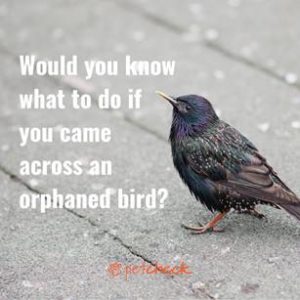

What to do?
First of all, finding a baby bird on its own doesn’t necessarily mean that it is orphaned. Other reasons for finding a baby bird on its own:
- Mum or dad can still be around (often you can hear the adult calling out nearby).
- Parents can leave their young for a few hours during the day, but not for a very long time (e.g. 4 hours or more).
- Baby birds can get pushed out of the nest by their siblings (or by parasitic cuckoo baby birds)
- Baby birds, or their nest, can be blown out of the tree by heavy winds.
Whenever possible, try to put the baby bird back in the nest and put the nest back in the tree. Then, from a distance, keep a lookout for the parents to come back. If you can’t wait around, you could check back in a few hours and see if there are fresh droppings on the ground (which can indicate that the parent has returned to feed the babies, and has cleaned the baby droppings out of the nest).
If you can’t find the nest, or it is too high up in the tree, you can make an alternative nest by using a bucket, basket, margarine tub lined with paper towel (and some holes drilled into the bottom, so the baby bird doesn’t drown in heavy rain), and place this makeshift nest as high as possible or as close as possible to the original nest in the same tree.
Some bird species such as parrots and kookaburras have young that can fly directly away from the nest. Other bird species such as magpies, currawongs, and noisy miners leave the nest before they have fully learned how to take off and fly. These young birds are fully feathered and can be seen on the ground practising flapping and hopping around. In most cases, the parents are nearby, and it is best to leave them alone, but if found in your yard, keep pets such as dogs and cats inside or on a lead, away from them to keep them safe while they are learning how to fly. If you try to put these fledgelings back in the nest, they will jump out again.
When to intervene?
If you find a young bird that is clearly sick or injured, or whose parents are dead, or that has clearly been abandoned for many hours, without any parents insight and no nest nearby, then we recommend to report the find to your local wildlife rescue organisation such as:
Then bring it to the nearest vet as soon as possible.
Cronulla Vet Clinic is proud to work together with the rescue organisations to do the best we can for our sick and injured wildlife.
When handling and transporting the baby bird, avoid stress as much as possible. Scoop the bird up gently with a towel or pillowcase, then place it in a cardboard box with ventilation holes in it. Keep the bird in a dark, quiet, warm area, until ready to be transported to a wildlife carer or the vet.
Make sure to note exactly where the bird came from so they can be returned to the same place if needed. Give the wildlife carer or vet as many details as possible regarding the suspected injuries or problems the bird may have.
If we all follow these guidelines, hopefully, healthy baby and fledgeling birds can stay with their parents, and only the birds in need of medical attention will be transported for treatment and care.
